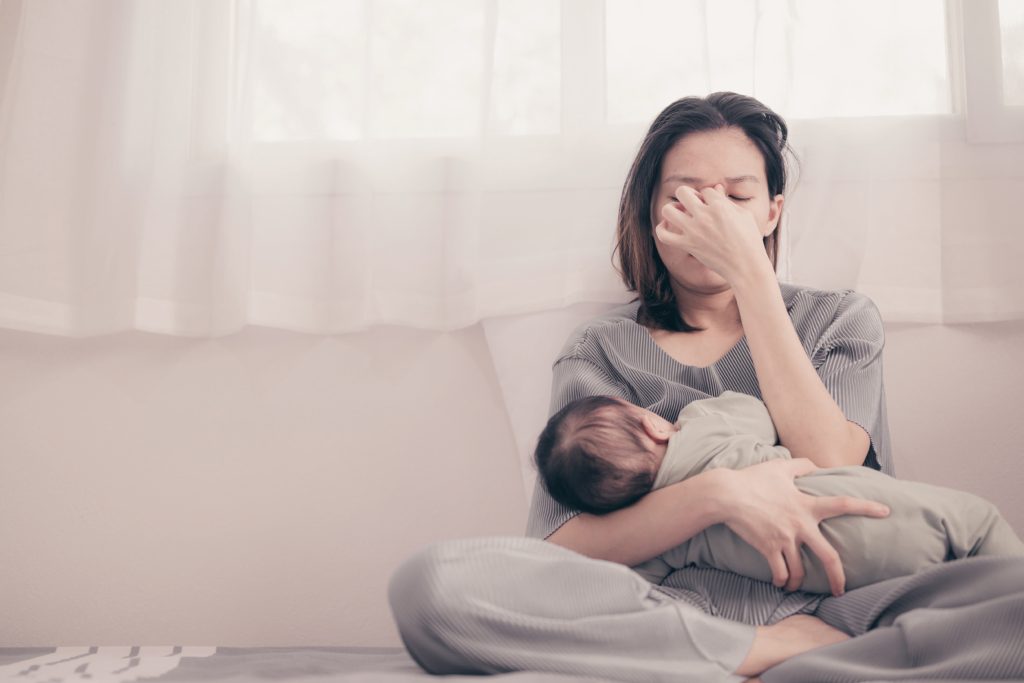Pregnancy and childbirth are a time of immense joy for families. However, those emotional highs can come with some serious lows. Most new mothers, and some fathers, will experience some form of anxiety, sadness or restlessness following the arrival of a baby. For National Mental Health Month, we’re breaking down the signs and causes of baby blues and postpartum depression.
Baby Blues
For many new parents, the time immediately after a baby arrives can be marked by feeling anxious, sad or irritable. These feelings can last for the first few days or weeks after having their baby. This is known as the “baby blues,” and it’s more common than you may think. According to the March of Dimes, around 80% of new parents experience some form of baby blues. The condition commonly occurs around two to three days after the baby’s arrival, and it can last up to two weeks.
The baby blues are caused by changes in hormones. Following delivery, the amount of estrogen and progesterone suddenly decreases, and this can cause mood swings. Sharp drops in hormone levels also can make people feel tired and depressed. The additional challenges of caring for a new baby, including lack of sleep, and anxiety or nervousness about being a new parent can compound these feelings. Individuals with a history of depression also are more susceptible to feeling sad after pregnancy.
ways to treat the baby blues
The baby blues typically go away without treatment. However, there are steps you can take to improve your mental health. If the feelings of anxiety, panic and depression worsen or do not subside, be sure to contact your health care provider.
- Get as much sleep as possible. Rest when the baby rests, whether that’s naps during the day or sleeping at night.
- Ask your friends, family and partner for support. Tell them exactly how they can help, including making meals, shopping for groceries or watching the baby while you sleep.
- Make time for yourself. Take time to do things you enjoy, such as listening to music, reading, watching a movie or working out.
- Be realistic in what you expect from yourself. You don’t have to do everything or keep your home perfect. Do what you can without overwhelming yourself.
- Connect with other new parents. They will be having similar experiences and may have the same concerns as you. You also can find a support group to help.
- Exercise when possible. It can help improve your mood.
- Avoid drinking alcohol. It can negatively impact your mood.
- Don’t make any major life changes too soon after having the baby if they can be avoided. This can cause more unnecessary stress.
symptoms of baby blues
- Mood swings
- Anxiety
- Sadness
- Irritability
- Feeling overwhelmed
- Crying
- Trouble concentrating
- Appetite changes
- Difficulty sleeping
Postpartum Depression
While the baby blues usually go away within a few days, the symptoms of postpartum depression last longer and are more severe. The condition usually begins within the first month after birth, and it can interfere with a parent’s ability to bond with their newborn. According to the Office on Women’s Health, one in eight new mothers report experiencing postpartum depression during the year after childbirth. The exact cause of postpartum depression is not known. Like baby blues, it is often associated with changes in hormone levels.
Studies have shown that the partners of new mothers also can experience postpartum depression. They may feel overwhelmed, anxious or sad and have changes in their eating and sleeping patterns. Sometimes known as paternal postpartum depression, the condition often affects young fathers who have a history of depression, are experiencing relationship issues or dealing with financial problems. Similar treatments and support that is provided to mothers experiencing postpartum depression can help the other parent as well.
risk factors for depression during or after pregnancy
- A personal or family history of depression
- A difficult pregnancy or birth experience
- Giving birth to twins or other multiples
- Relationship problems with your partner
- Financial problems or lack of support to help care for the baby
- Unplanned pregnancy
symptoms of postpartum depression
- Severe mood swings
- Anxiety or panic attacks
- Difficulty bonding with your baby
- Withdrawing from social support like friends and families
- Changes in diet, such as not eating enough or eating much more than usual
- Altered sleep patterns, including insomnia and sleeping too much
- Lethargy or overwhelming tiredness
- Loss of interest in hobbies or previously enjoyed activities
- Intense irritability and anger
- Hopelessness
- Feelings of worthlessness, shame, guilt or inadequacy
- Difficult making decisions or thinking clearly
- Restlessness
- Thoughts of harming yourself or
- your baby
- Recurring thoughts of death or suicide
Sources: March of Dimes, Mayo Clinic, Office of Women’s Health
For immediate assistance with suicidal thoughts, you can call 988 to reach the Suicide and Crisis Lifeline or visit 988lifeline.org/chat to chat.
